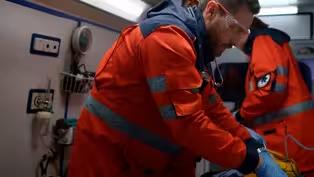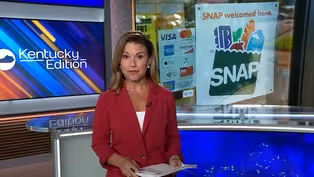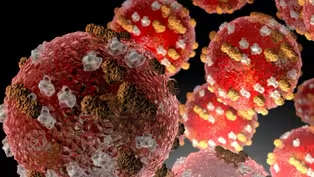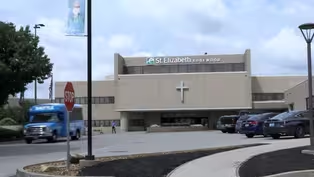
KSU Fighting Bee-Threatening Mite
Clip: Season 4 Episode 21 | 3m 28sVideo has Closed Captions
KSU is working to educate beekeepers and experimenting with genetics.
Bees are an important part of the ecosystem and essential to growing produce. But a small parasitic mite is putting bees at risk. Kentucky State University is now working to fight the mite by educating beekeepers and experimenting with genetics.
Problems playing video? | Closed Captioning Feedback
Problems playing video? | Closed Captioning Feedback
Kentucky Edition is a local public television program presented by KET

KSU Fighting Bee-Threatening Mite
Clip: Season 4 Episode 21 | 3m 28sVideo has Closed Captions
Bees are an important part of the ecosystem and essential to growing produce. But a small parasitic mite is putting bees at risk. Kentucky State University is now working to fight the mite by educating beekeepers and experimenting with genetics.
Problems playing video? | Closed Captioning Feedback
How to Watch Kentucky Edition
Kentucky Edition is available to stream on pbs.org and the free PBS App, available on iPhone, Apple TV, Android TV, Android smartphones, Amazon Fire TV, Amazon Fire Tablet, Roku, Samsung Smart TV, and Vizio.
Providing Support for PBS.org
Learn Moreabout PBS online sponsorshipBees are an important part of the ecosystem and essential to growing produce.
But a small parasite called the Varroa mite is putting bees at risk.
Kentucky State University is doing its part to fight the mite through educating beekeepers and experimenting with genetics.
Right now, Varroa mites are beekeeper enemy number one that they do damage to the bee first of all, physically.
And then these might wounds become a doorway for viruses.
If the mites were unchecked, they would kill a lot of beehives, no doubt.
We did actually have another very serious parasite, and it appeared in the 1980s in the United States.
And then we found it in Kentucky in 1989, in bees from the Elizabethtown area.
And that was something called the tracheal mite.
And, and, killed thousands and thousands of Kentucky bee hives.
And we eventually learned how to control it.
And is now considered a fairly minor problem.
And then just a few years after that, we got the Varroa mite.
There's a virus that's called deformed wing virus.
And that will impact the wings of the bees.
They will they will look very, torn and tattered.
Sometimes they aren't even there.
Another virus, impacts the amount of hair that is on a bee.
It will look very shiny and greasy.
And that's another red flag that my hive has a virus, and I've got to act.
Many of the vegetables and fruits that we like are bee pollinated and require honeybees to, to set, fruit plants that livestock eat like alfalfa and clover.
Soybeans require honeybee pollination.
So we think also of beef and dairy products in Kentucky, horses to consume alfalfa.
So many animals indirectly require honeybee pollination.
But what it comes down to is that new beekeepers have to be on a learning curve.
And to learn about managing their bees with this parasite.
We want beekeepers feeling comfortable enough to go in every two weeks, because if you begin to see deformed wings, you can treat, you can do a mite sample, and then you can apply a mite aside and get those numbers down.
We are trying to get more genetics, different genetics into our highs.
We are working with beekeepers to have them select hives that have shown some tolerance to these mites.
That's a long term project, but that's happening.
It is happening.
There's a great saying that I like to use from a botanist from the 18th century.
We need standing armies of beekeepers.
It's that critically important.
If we can't feed our people, we have 8 billion with a bee.
People in the world to feed.
It's that simple.
If we don't have pollinators, then we can't feed them.
That's it.
It comes down to that.
That's honey.
You got a finger.
Doctor Potter is also a part of a national research organization working on a preventative strategy for a new type of mite that's on the rise.
The ellipse might currently exist in Asia and has not crossed into the U.S., but experts say it could potentially be more destructive than the other mite invasions that this country has faced.
Cannabis-related Poisonings On The Rise In Kentucky
Video has Closed Captions
Clip: S4 Ep21 | 4m 26s | A new report says there was a 43% rise in cannabis-related poisonings among Kentuckians under 18. (4m 26s)
Kentucky Bankers Ready To Help State's Housing Crisis
Video has Closed Captions
Clip: S4 Ep21 | 5m 15s | Some business leaders say they're ready to step up to offer financing to make it happen. (5m 15s)
Kentucky Sues Over Demand For SNAP Data
Video has Closed Captions
Clip: S4 Ep21 | 48s | The Trump administration is demanding personal data of people enrolled in SNAP. (48s)
New Measles Case Confirmed in Kentucky
Video has Closed Captions
Clip: S4 Ep21 | 47s | That brings the total number of cases in Kentucky this year to 14. (47s)
Northern Kentucky Hospital Ranked Best in the State
Video has Closed Captions
Clip: S4 Ep21 | 3m 2s | This is the first time the hospital has claimed this honor. (3m 2s)
Providing Support for PBS.org
Learn Moreabout PBS online sponsorship
- News and Public Affairs

Top journalists deliver compelling original analysis of the hour's headlines.

- News and Public Affairs

FRONTLINE is investigative journalism that questions, explains and changes our world.












Support for PBS provided by:
Kentucky Edition is a local public television program presented by KET




